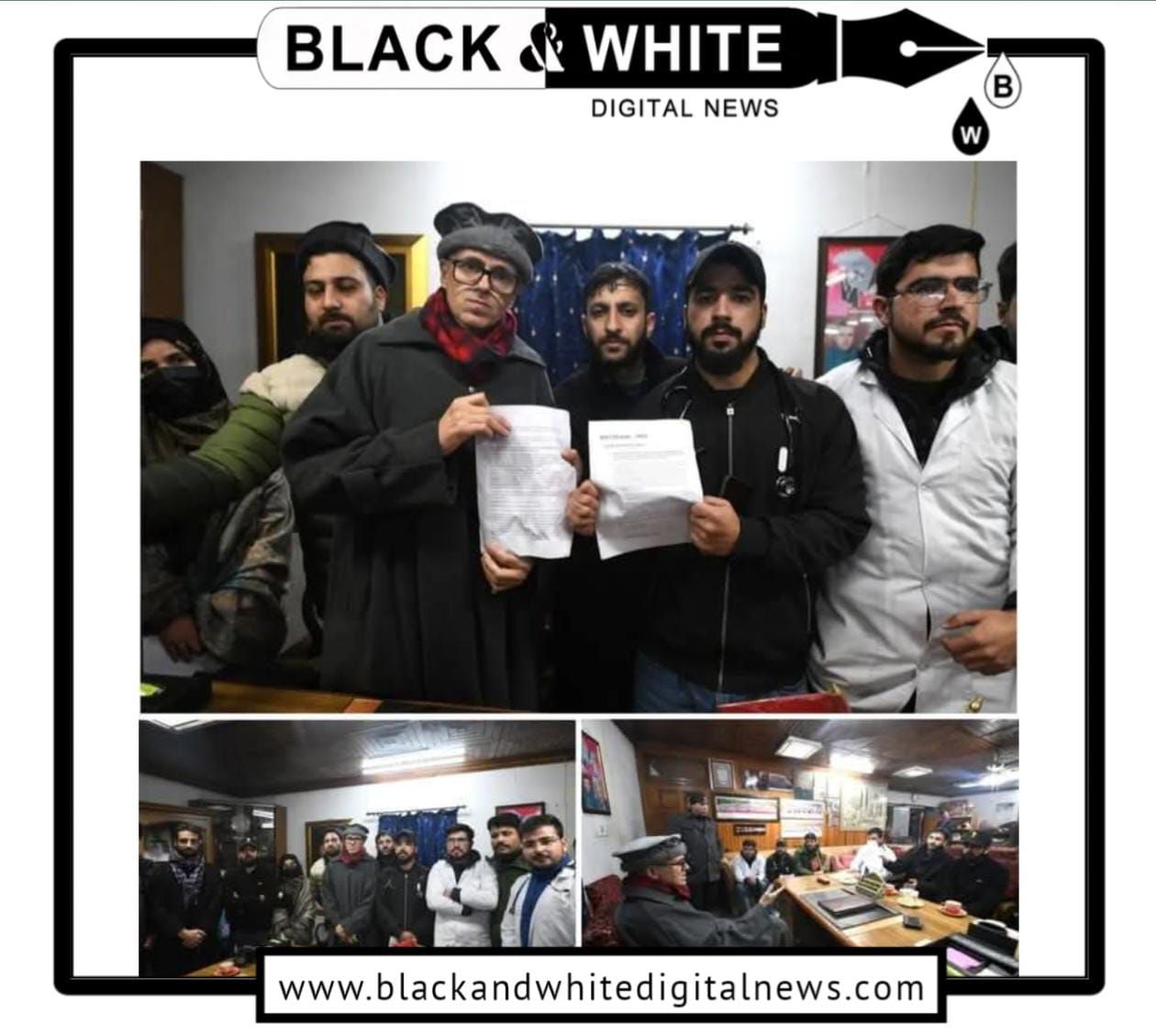A House Divided: Omar Abdullah’s Bold Step Amid Student Protests on Reservation Policy Sparks Political Tempest in J&K.
||Black and White Digital News||
||Tejveer Singh December 24,2024 ||
Jammu : In a dramatic turn of events, Chief Minister Omar Abdullah reached out to students protesting against the existing reservation policy in Jammu and Kashmir. The demonstrations, which have brought together unlikely allies from separatist and mainstream political circles, underscore the intensity of the debate on reservation reforms in the Union Territory.
The protests reached a boiling point outside the Chief Minister’s official residence in Jammu, where a delegation of five students from the Open Merit Students Association (OMSA) was invited for a meeting with Abdullah. This direct engagement marked an effort to defuse tensions and chart a path toward resolving the contentious issue.
Following the meeting, the Chief Minister sought six months to devise a comprehensive and fair resolution, emphasizing his commitment to democratic dialogue. “Today, I met with representatives of the Open Merit Students Association. The beauty of democracy lies in the right to be heard and the ability to engage in dialogue with mutual cooperation,” Abdullah shared on social media, along with photos from the meeting.
He further assured that the communication channel would remain open, free from intermediaries or distractions, to ensure transparency in addressing the students’ demands.
A Controversy That Unites and Divides:
The call for rationalizing reservation rules has created an unprecedented alignment between separatist leaders and mainstream politicians. Hurriyat Conference leader Mirwaiz Umar Farooq lent his voice to the cause, expressing solidarity with the protesting students. “The issue of reservations should be addressed with justice and fairness by those in charge, safeguarding the interests of all segments of society. The current status of reservations undermines the interests of the general/open merit category,” Mirwaiz wrote on social media. He further stated his willingness to join the sit-in protests, contingent on receiving permission from authorities.
Meanwhile, National Conference (NC) MP Aga Ruhullah Mehdi staged a protest outside the residence of his party’s own Chief Minister in Srinagar, demonstrating a rare instance of intra-party dissent. Mehdi’s actions, though aligned with the students’ demands, drew criticism from Abdullah, who invoked the timeless wisdom of Rudyard Kipling to counsel patience and resilience in the face of adversity.
“If you can keep your head when all about you are losing theirs and blaming it on you… If you can wait and not be tired by waiting, or being lied about, don’t deal in lies, or being hated, don’t give way to hating…” Abdullah posted on social media, quoting Kipling’s poem If. The poetic response, a blend of frustration and determination, sought to reaffirm his commitment to navigating the crisis with clarity and resolve.
Political Ripples Across the Spectrum:
The rare unity between separatists and mainstream political leaders has added a layer of complexity to the ongoing debate. While the Hurriyat’s involvement hints at the broader societal ramifications of the reservation policy, Mehdi’s defiance highlights internal fault lines within the National Conference.
Critics argue that the government’s delay in addressing the reservation policy has escalated the situation. “The current status of reservations disproportionately impacts the open merit category. This cannot be ignored anymore,” said a student protester, reiterating OMSA’s demand for immediate action.
Despite the visible fractures within his party and the mounting political pressure, Abdullah’s outreach to the students signifies a critical first step. His assurance of a comprehensive solution within six months suggests a strategic approach to balance competing interests while preserving the principles of equity and justice.
As protests continue to ripple across the Union Territory, Abdullah’s direct engagement has momentarily eased tensions but left much unresolved. With both separatists and mainstream leaders keeping a watchful eye, the next six months will be pivotal in determining whether the government can deliver on its promise of rationalizing reservation rules without further polarizing the region.
The Chief Minister’s decision to engage directly with the students demonstrates a willingness to tackle the issue head-on. However, the path to a sustainable resolution remains fraught with political challenges and societal expectations. Whether this moment marks the beginning of a genuine reform process or another chapter in the volatile politics of Jammu and Kashmir remains to be seen.




